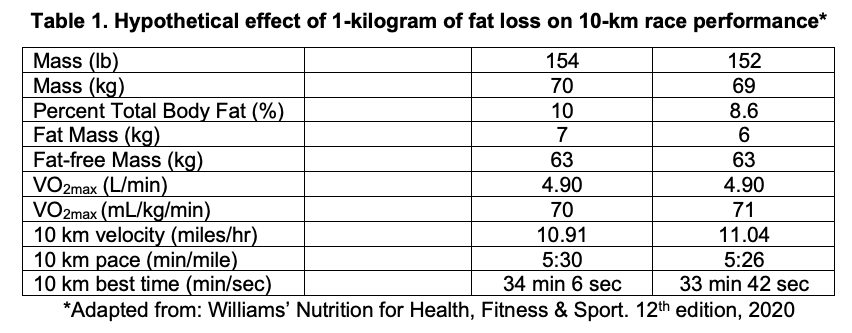Body composition as a limit of human endurance performance
Recently, I read the book Endure: Mind, Body, and the Curiously Elastic Limits of Human Performance by Alex Hutchinson, a former Canadian national-team long-distance runner and physicist. Hutchinson was one of only two reporters granted access to Nike’s ‘Breaking2’ attempt to break the 2-hour marathon barrier. The ‘Breaking2’ marathon project was a scientific-based attempt to assist marathoner Eliud Kipchoge in breaking the 2-hour marathon barrier. The assistance included things such as racecourse selection and strategy as well as specially designed shoes and clothing. Although Eliud Kipchoge came close to breaking the 2-hour marathon barrier, in the end, he missed by just less than a minute (2:00:25). In addition to detailing Nike’s ‘Breaking2' marathon project, Hutchinson also explains what he feels are the limits of human endurance performance, exploring the physical limits of pain, muscle, oxygen, heat, thirst, fuel, etc. Although one can make a case for each of these being a limit to human endurance performance, it was surprising to find that body composition did not make the list. Granted, it goes without saying that most elite-level endurance athletes carry a minimum amount of body fat. However, for those of us who are not elite-level endurance athletes, body composition can be a limiting factor.
Body Composition as a Limiting Factor
Clearly, excess body fat weight will slow down a distance runner. The runner would need to transport the extra weight and, unlike muscle, excess body fat does not contribute to the runner’s forward motion. Let’s look at what losing 1 kilogram (2.2 lb) of fat mass would do for endurance performance. If a 70 kg (154 lb) man were to lose 1 kilogram of total body fat mass their percent body fat would drop from 10% to 8.6% (Table). Although losing 1 kilogram of body fat will not affect absolute (L/min) maximal aerobic capacity (VO2max), it would increase VO2max when expressed relative to body weight (mL/kg/min). So using our 70 kg (154 lb) man, a 1-kilogram loss of body fat would not affect the absolute VO2max (4.90 L/min), however, it would increase his relative VO2max from 70 mL/kg/min to 71 mL/kg/min. Truly, a small increase in relative VO2max. More than the change in relative VO2max, it has been theorized that a 1-kilogram loss of fat mass would result in a 4 second per mile increase in race pace (Burfoot, 2007). This 4-second increase in race pace would result in a reduction in 24 seconds for our 70 kg man’s 10 kilometer personnel best time (Table). Besides being less weight to carry for the 10-kilometer race, a loss of 1 kilogram of fat mass would reduce air resistance by approximately 0.6% (O’Connor et al., 2007). Furthermore, a 1-kilogram loss in fat mass could also theoretically improve running economy or the percent of your VO2max that you utilize at a given workload or race pace.

It is important to remember that the beneficial effects of body composition are most relevant for those athletes who have excess body fat to lose and may not be applicable to athletes who are already at their optimal body weight. In addition, it is important to remember that the loss of fat-free mass would probably adversely affect athletic performance.
Take-Home Message
Many factors can be thought of as limitations to endurance performance. For the non-elite endurance athlete, body composition should be considered a limiting factor. It is also important to consider that for a number of reasons it is difficult to predict with certainty a precise percentage of body fat for a given athlete that will result in optimal performance. As a final note, on October 12, 2019, Eliud Kipchoge ran the marathon distance at a special event in Vienna, Austria, in a time of 1:59:40 breaking the 2-hour marathon barrier.
References
Burfoot A. What is your ideal weight? Runner’s World 42(7)67-69, 2007.
Dawson ES, Branch JD, Stephenson TJ (ed). Williams’ Nutrition for Health, Fitness & Sport. 12th edition. McGraw-Hill Education, New York 2020.
Hutchinson A. Endure: Mind, Body, and the Curiously Elastic Limits of Human Performance. William Morrow, New York 2018.
O’Connor H, Olds T, Maughan RJ. Physique and performance for track and field events. Journal of Sports Sciences 25(S1):S49-S60, 2007.
About the Author
Donald Dengel, Ph.D., is a Professor in the School of Kinesiology at the University of Minnesota and is a co-founder of Dexalytics. He serves as the Director of the Laboratory of Integrative Human Physiology, which provides clinical vascular, metabolic, exercise and body composition testing for researchers across the University of Minnesota.